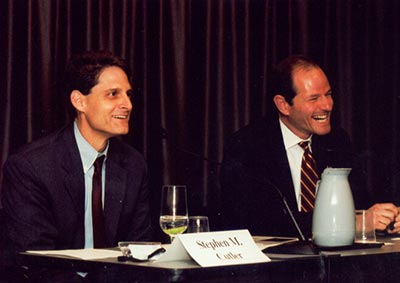

As securities enforcement attracted headlines it also drew other law enforcement agencies’ eyes to the securities markets. Of course, other agencies had always shared oversight of the securities markets; states enforced their blue sky laws, self-regulatory agencies supervised their members, and most notably the Department of Justice brought criminal charges for Federal securities laws violations, with the U.S. Attorney’s Office for the Southern District of New York in particular having an active Securities and Commodities Fraud unit. In 2002, though, the Division found itself blindsided when New York Attorney General Eliot Spitzer announced that an investigation had uncovered widespread conflicts of interest in analysts at investment banks. (1) The SEC and other regulators belatedly joined with Spitzer in a shared investigation of the industry that resulted in a penalties of more that $1 billion paid by the banks and in structural reform to ensure that analysts’ future recommendations were not slanted to benefit their employers. Spitzer and the Division would alternately cooperate and compete in a number of matters over the next few years.

This period produced a string of cases revealing systemic wrongdoing in other major areas of the financial markets, including mutual fund companies that had allowed sophisticated investors to engage in undisclosed “market timing” purchases and sales;(2) corporations that had backdated stock option grants to executives;(3) and “specialists” on the New York Stock Exchange who traded ahead of client orders in violation of the rules.(4) The Division pursued all these, while still policing the issues it had scrutinized for decades, from microcap fraud, to renewed FCPA violations, to insider trading (the insider trading case against Martha Stewart would perhaps rank alongside Enron as the best-known Enforcement matter during this period).(5)
Under directors Stephen Cutler (2001-2005) and Linda Chatman Thomsen (2005-2009) the Division would enjoy significant successes, but in a familiar pattern the burst of support it received after 2001 faded with surprising speed, especially after Chris Cox succeeded William Donaldson as chair in 2005. Funding and staffing for the Division dropped, and several Commissioners vocally criticized large corporate penalties, winning a significant victory with a 2006 release that appeared to narrow the situations in which corporate penalties would be sought.(6) Soon thereafter, in a widely reported move that underlined the Commission’s new approach, it cut a recommended penalty imposed on a major investment bank from $25 million to $2 million.(7) According to former chair Arthur Levitt, collectively these developments produced “a demoralizing of the Enforcement staff.”(8) And worse was to come.
(1) John Cassidy, The Investigation, New Yorker April 7, 2003.
(2) Landon Thomas, Jr., SEC Putting Mutual Funds Under Scrutiny on Late Trading, NY Times Sept. 5, 2003. C1.
(3) Linda Chatman Thomsen, Options Backdating: The Enforcement Perspective, SEC Speech October 30, 2006.
(4) Settlement Reached with Five Specialist Firms for Violating Federal Securities Laws and NYSE Regulations, SEC News Release 2004-42 (March 30, 2004).
(5) Landon Thomas, Martha Stewart Settles Civil Insider-Trading Case, N.Y. Times Aug. 7, 2006.
(6) Statement of the Securities and Exchange Commission Concerning Financial Penalties, SEC News Release 2006-4 (Jan. 4, 2006)
(7) Jenny Anderson, A Fear that the Agency’s Watchdog is Losing its Bite, Wash. Post. Apr. 8, 2008: C1.
(8) Statement of Arthur Levitt, Hearings before the Subcommittee on Securities and Insurance and Investment, Senate Committee on Banking, Housing, and Urban Affairs (May 7, 2008).
Stephen M. Cutler joined the SEC as Deputy Director of the Enforcement Division in January 1999 and served as Director of the Division from October 2001 to May 2005. He supervised the agency’s investigations of some of the largest financial reporting failures in the nation’s history up to that point, including those at Enron, WorldCom, Adelphia, Qwest, Tyco and HealthSouth. He also oversaw the agency’s investigations into violations by NYSE specialist firms and individual specialists for inter-positioning and trading-ahead violations and played a key role in the historic “global settlement” with brokerage firms over research analyst conflicts of interest.